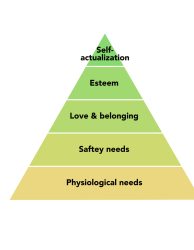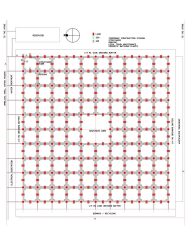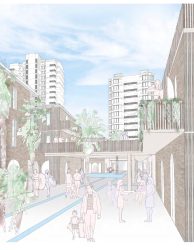
A Pandemic Society – A few notes on our streets and shops
by Humphrey Keung
Undeniably, COVID-19 has changed everything. How we work, we shop, we meet. etc. The words “street” and “life” do not sound relevant to each other anymore. This article looks at the pandemic through a perspective from Hong Kong and trying to explore some ideas of our future streets and shops.
STREETS
Hong Kongers eat, play, and work outside their home, as they are too small for anything other than resting. In 2016, each citizen could only barely afford a room around 160 square feet[1]. They are always dining outside, they are always travelling during weekends, They are always partying in hotels or “party rooms” in factory buildings as almost no one’s home could hold a party. The lack of space also facility across the booming of sharing office, Co-working space operators were occupying about 2.16 million square feet across the city back in 2019[2]. In short, we basically call bedrooms a home and most of our activities took place on the streets and shops outside.
And suddenly, we are forced to stay at our home.
Like most of the world, work from home policy was adopted by most of the offices and most of the civil services were paused during the peak waves[3] of the pandemic. Under such a lock down, our whole life has been reduced to only a bed and a screen, we could not stop reflecting on how abnormal our dwelling spaces always are and how significant does street and public space mean to us.
One of the most obvious showcases of the problem is the growing cases of domestic violence. The Federation of Women’s Centres in Hong Kong has recorded a surge in cases during the pandemic, doubled compared to the same period in 2019. More victims find the situation in pandemic even more helpless as they found no place to escape or physically talk to[4]. This is probably an inconvenient truth, Hong Kong people have too little space at home and street has become a buffering zone for these unfortunate souls. They definitely deserve more.
When the quarantine meets the fatigue, people are trying to “fight-back” for some space outside their home. You could find streets and country parks filled with people in Hong Kong. Street gymers, joggers, weekend hikers are suddenly full of town. The alleys of Lan Kwai Fong, Soho area in Central, are filled with drinkers and laughters again. In fact, there are always new confirmed cases found consistently in Hong Kong and restrictions are never fully lifted up to this moment but people just do not bother. Maybe it is our nature to be in need of space, a territory, even that might cost our health.
Given the situation of the limited dwelling space in Hong Kong, the streets are always playing an important role as a supplement to the dwelling space. This role could never be replaced as long as the living situation in Hong Kong has not yet been improved. We should embrace the fact people would not stay at home patiently forever and to articulate the street with a new, resilient standard. From now on, streets shall not only handle residents and strangers safely, but also more healthily and hygienically. From placement of street furnitures to pocket space planning, architects and planners should allow sufficient room and variety for safe distancing; more washing basins and hand sanitizers are expected even in public parks. We shall adapt the new norm in order to gain back our precious street life.
SHOPS
On the other end of the streets, shop owners have been holding on to their grib as the pandemic has confined everyone to their home. Ofiices and retail rent has been searching for a ground since the out-break of COVID-19 and the vacancy rate is steadily increasing.[5]
On the other hand, online based businesses are booming. As everyone stays home and not so many households have a decent kitchen for cooking, people rely on delivery for meals when they could not eat out. Deliveroo, a London based online delivery company, has recorded a 8 billion HKD revenue during the pandemic, according to research by Capital Economics. HKTVmall, a new local online supermarket, has been expanding their market share on groceries throughout the pandemic.
As one of the cities with the highest rents around the world, it is high time for business owners to evaluate the necessity for maintaining a real shop and moving their business online. When such migration becomes the majority, what is the role to play for traditional shops and streets?
Shops probably would be taking the extremes. One thing for sure is, we are not ever going back to the life we had. All this time has proven that we could work remotely meanwhile the offices are still running; daily goods and food are just a thumb away thanks to the technology. Yet, online shops could not completely replace the street shops as they could not offer the consumers an experience nor in case of emergencies. Shops could either take the approach of providing services for urgent customers, which is limited to a small neighborhood or community; or taking the other approach of being more about the experience and concepts. The role of the architects and designers becomes more significant in the later because shops shall not only sell the product anymore, but the brand, the experience, and the environment. The shops should play a role of elevating the user experience of the product or the brand in order to compete with the rise of online businesses.
However, it is inevitable street shops become less and less significant in our daily routines. What if the vacancies could become part of the public place? In a well developed environment, it is hard to create more space on an existing street. As aforesaid, streets shall be able to maintain their role and allow a new safe room for everyone; if the shops are really gone for good, could we just take them back and be more generous to the general public?
Appendix
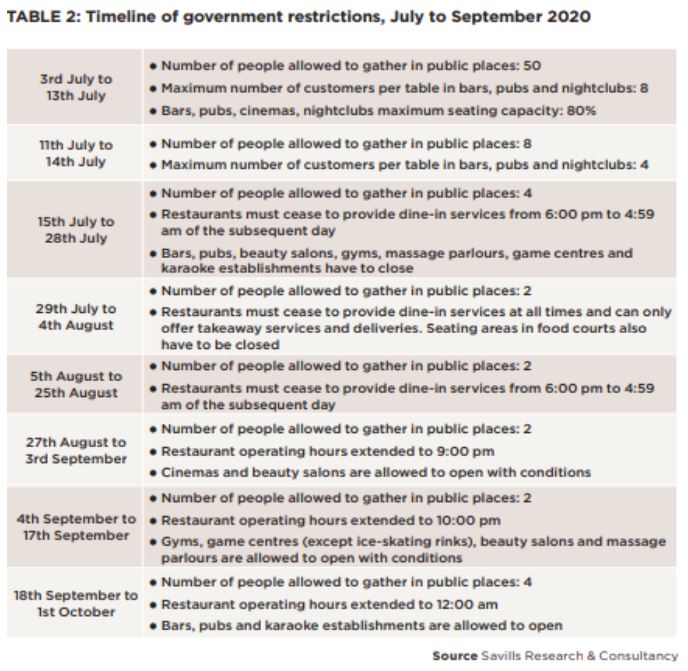

A snapshot of passengers with masks on.
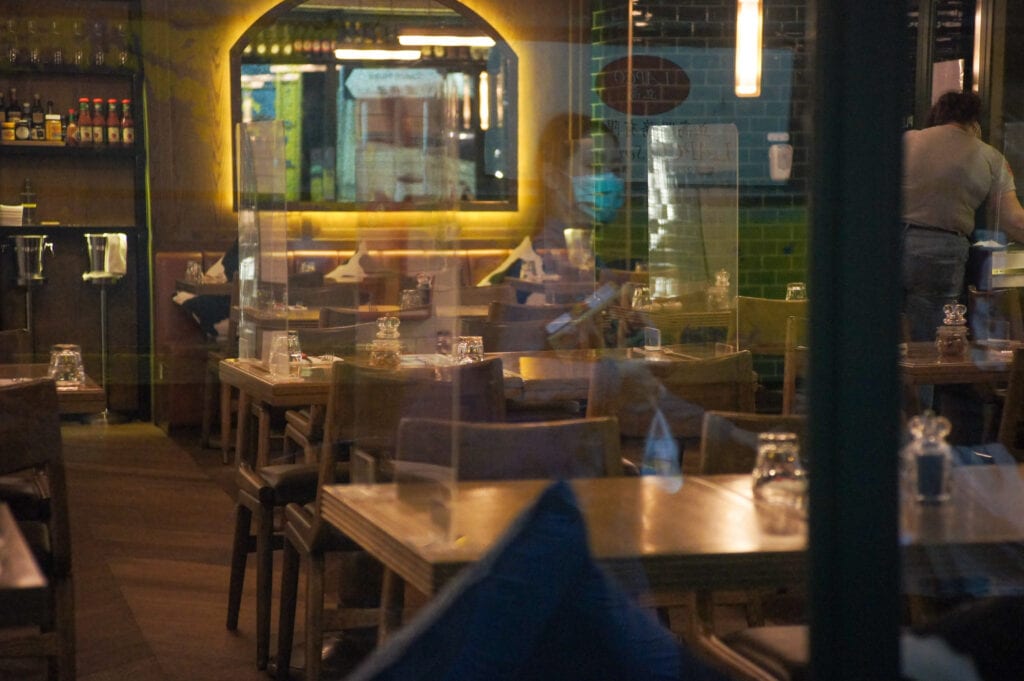
Under pandemic, table size is restricted and partitions are a must for restaurants. In the picture, a pedestrian with mask gazing inside of the restaurant.
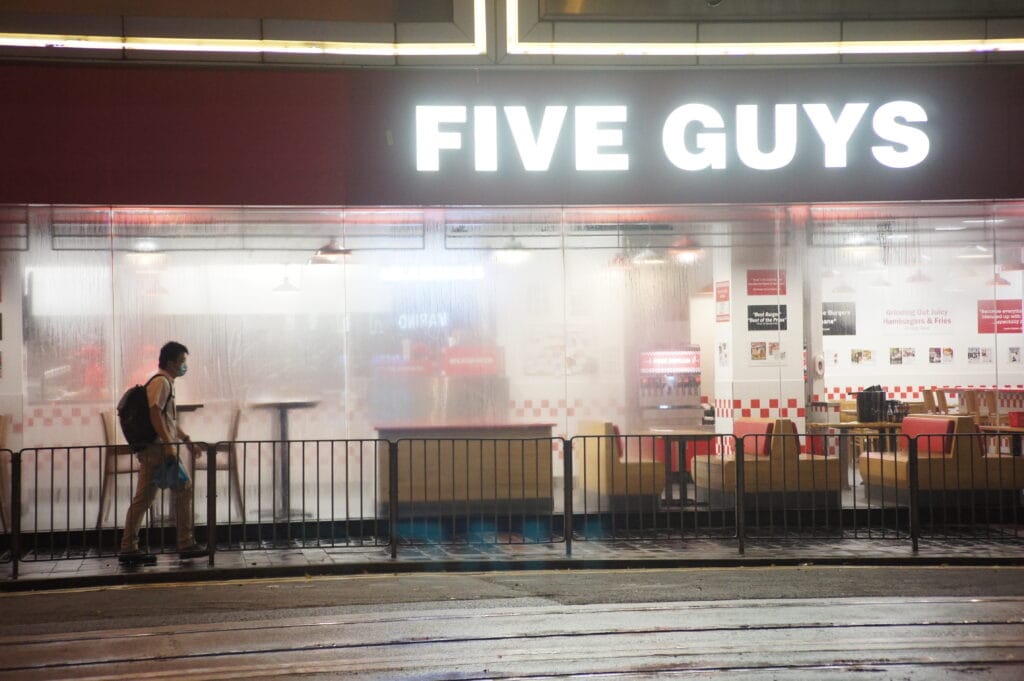
Under pandemic, few people go to restaurant for food.
[1] Hong Kong SAR. Census and Statistics Department, Hong Kong SAR Government. 2016 Population By-censes.
[2] Hong Kong. Hong Kong Co-working Space Too Crowded, Some Operators May Pull Back in 2019, Savills Says. By Pearl Liu. April 14, 2019. Accessed November 1, 2020. https://www.scmp.com/property/hong-kong-china/article/3006281/hong-kong-co-working-space-too-crowded-some-operators-may.
Co-working space operators currently occupy about 2.16 million sq ft cross the city, according to Savills, doubling in size since the end of 2017.
[3]Hong Kong. Savill Research and Consultancy. Timeline of Government Restrictions, July to September 2020.
A short summary by Savill for reference.
[4] Hong Kong. RTHK. Domestic Violence Has Soared in HK, Group Says.
The director Sisi Liu says in an interview that the Federation of Women’s Centres says has recorded a surge in domestic violence cases during the coronavirus pandemic, with 34 victims seeking the Federation’s help from January to March, compared to just 16 cases over the same period last year.
[5] Hong Kong. Savill Research and Consultancy. Market in Minutes, Retail Leasing – October 2020.

